Thinking on Recipe Cards
I think on recipe cards. In 2025, while everyone else delegates their thinking to AI, I've spent the past year cataloguing handwritten index cards in a wooden box originally designed for storing recipes. This might be the most important "productivity thing" I've done in the last decade - more impactful than any software, and in some ways, comparable to the value of using AI, though for entirely different reasons.
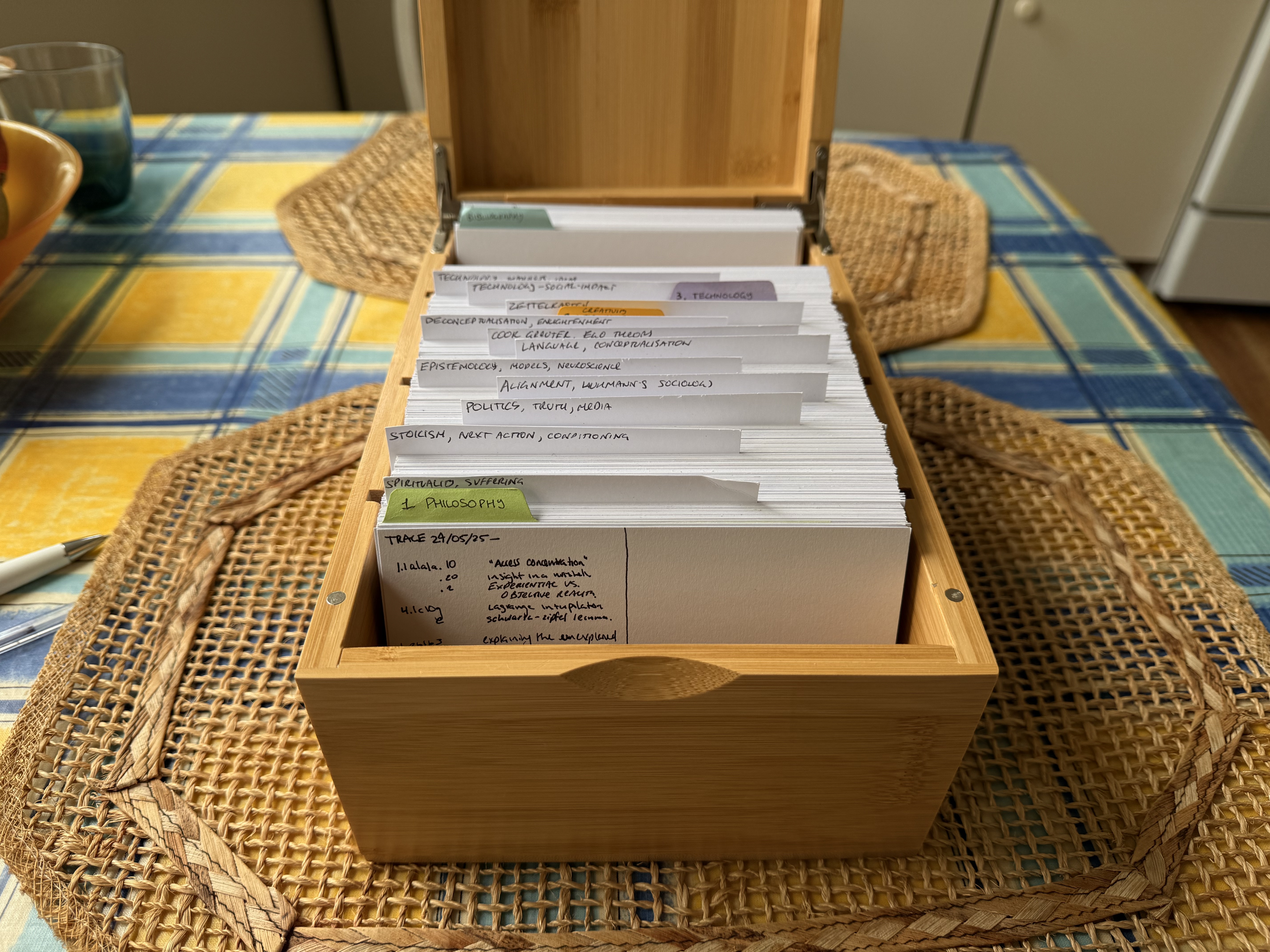
my zettelkasten (or "slip box" in German) - a box filled with hundreds of handwritten cards loosely connected to each other in a graph
Productivity lost its meaning
We live in an age obsessed with making everything easier. Planning software minimizes the time you spend planning. AI transforms hours of research into minutes. But when things are easy, they make us lazy - and we're now discovering that using AI to write has been shown to hinder learning and memory. When we offload our thinking, we naturally think less and remember less.
This is an effect I actively resist. Thinking and accumulating knowledge makes everyday life more exciting. When you integrate new experiences thoughtfully into your own neural network, even the smallest of things become so much more meaningful. Knowledge gives life fidelity. So when it comes to building my foundational map of the world, I refuse to outsource so much of my thinking to AI.
Writing Is Thinking
How do we think more effectively? There are many ways, but writing remains fundamental. Richard Feynman argued that his notes weren't proof he had thought about something - they were the thinking itself. Yet in our modern world, genuine writing is becoming extinct.
We learn to write in school - though kids now use ChatGPT as a proxy for writing. After formal education, there's barely any pressure to write long-form. A 280-character tweet is fundamentally different from an essay. Modern incentives push us away from writing. When we do attempt something substantial, creator culture forces us to consider how it will be perceived, injecting ego and the desire to be externally recognized into what is or could be a learning process that is purely for its own sake.
But those that don't write, at least they read, right? The issue is that we wrongly conflate reading with thinking. We buy a book, make sure to read every chapter, and call it done. But real learning happens when you dissect what you've read, understand it actively, and connect it to what you already know. Writing is both the proof and the process of this deeper engagement.
Enter the Zettelkasten
The solution is a system so far removed from AI's reach that it forces genuine thinking while making the process enjoyable enough to compete with modern distractions. After experimenting with Notion, Roam Research, and Obsidian - all of which seem to devolve into sophisticated bookmarking tools - I discovered something better in history.
Niklas Luhmann, an influential 20th-century German sociologist, self-taught his way to a PhD and published over 400 articles and 70 books in 24 years - an order of magnitude more than the average academic. He credited everything to his system of 90,000 index cards filed in wooden boxes.
The Beautiful Simplicity
The rules are almost laughably simple:
- Write in your own words. No copying allowed - you must reflect and synthesize.
- Each idea must fit on an A6 card
- File new cards behind a related existing card.
That's it. Each card takes three to five minutes to write. I'm not forced to write full essays or publish anything. I simply reflect on something or crystallize an idea from a conversation or book. But this simplicity creates emergent complexity (more on this later).
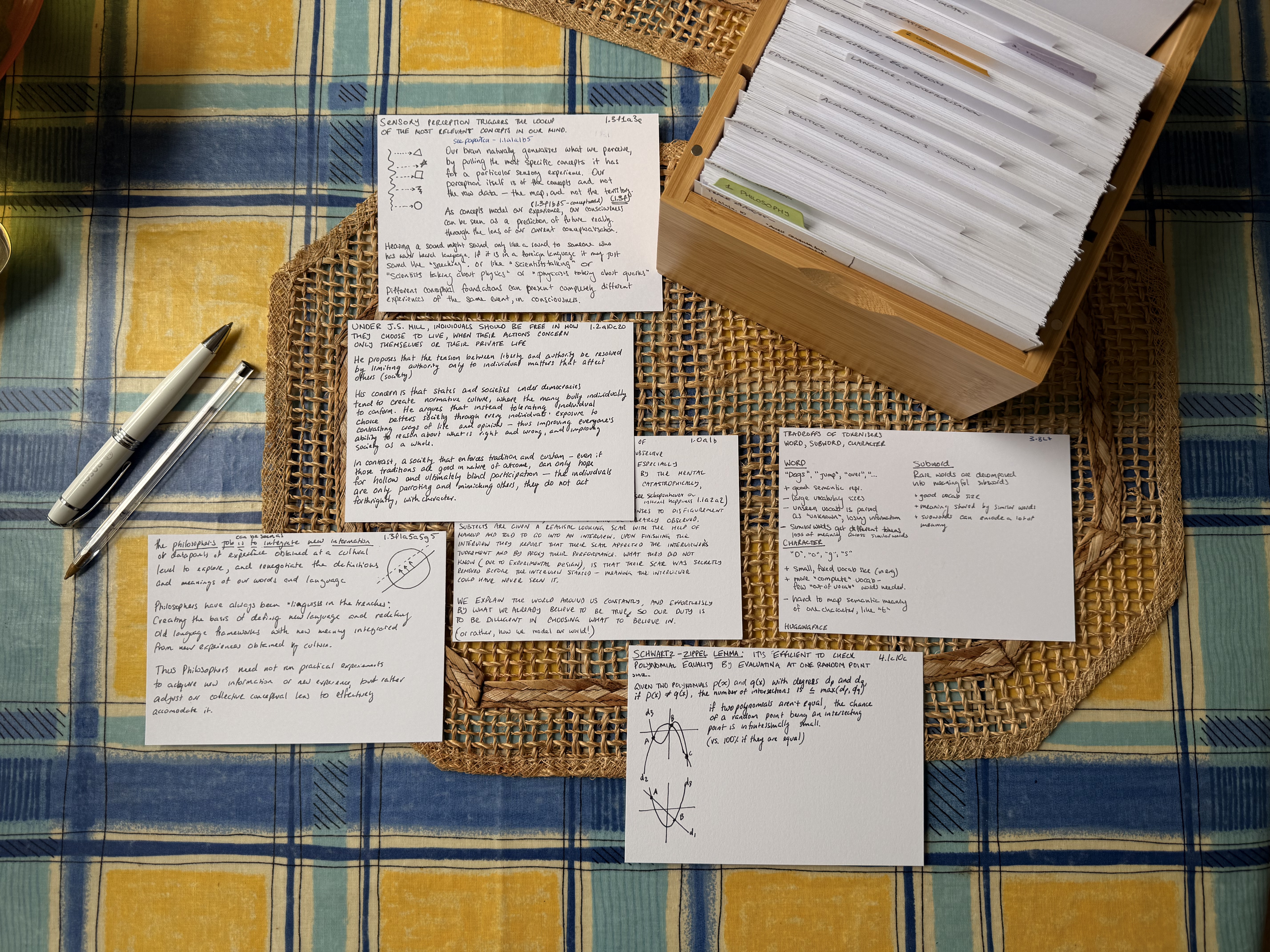
Friction as a Feature
The system introduces deliberate friction. Modern software tries to eliminate any such friction in order to sell more copies, but Zettelkasten introduces friction as a feature.
For example, finding a specific card among my 600 current cards can take over a minute. But this is actually a very good thing. While searching for the one I want, I flip through dozens of other cards, reinforcing ideas and priming myself to make unexpected connections. Before I get to read that one card I am thinking about, I end up skimming 5-15 other cards. This acts as a form of spaced repetition helping me retain ideas better without having to expicitly study or review what I wrote.
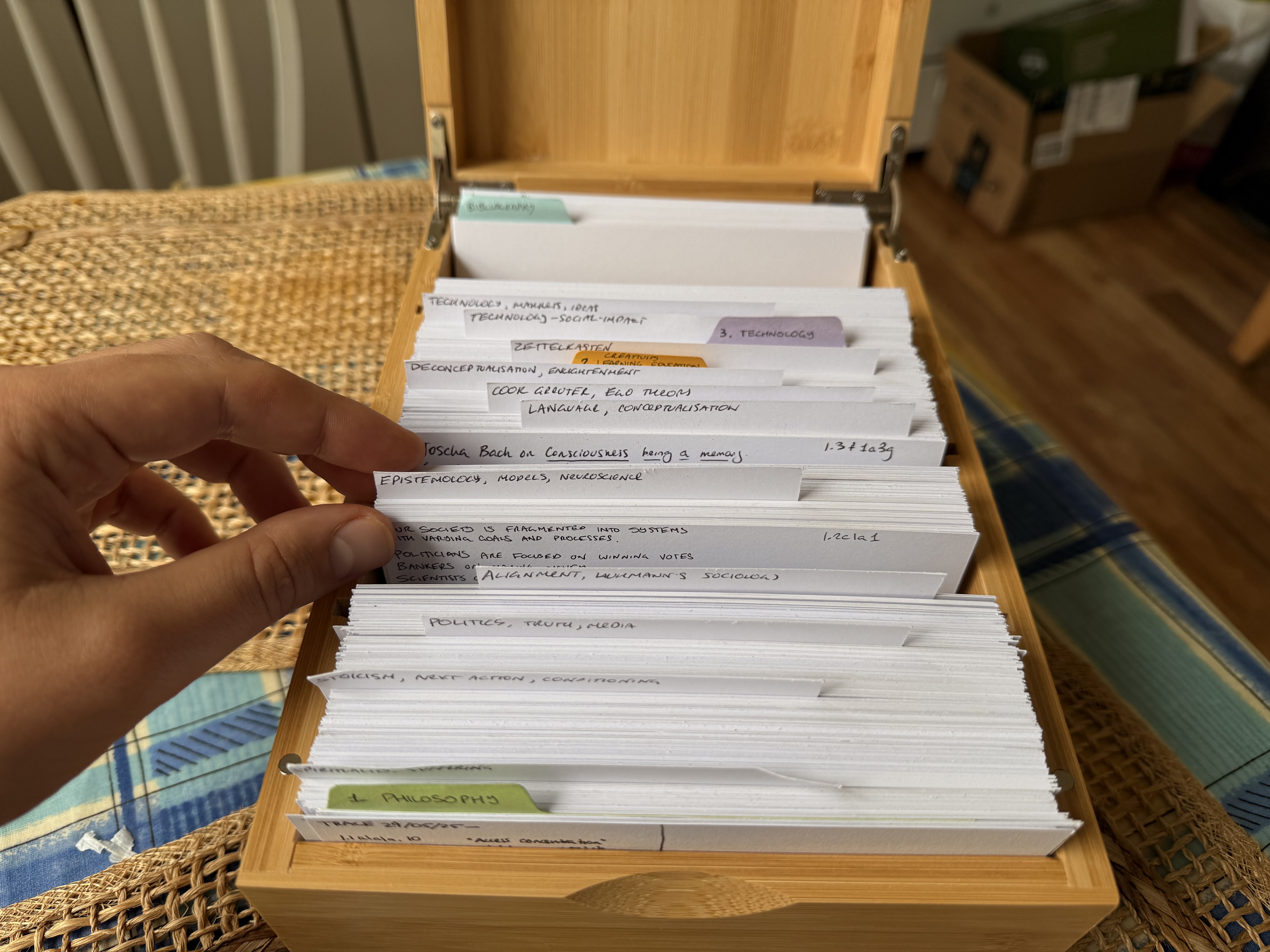
Another example is the writing itself. Writing with a pen slows you down compared to typing. But this is a very good thing, once again - as my mind has more time to form ideas properly. There's no temptation to copy-paste or run something through AI. No shortcuts! Every bit of thinking, shaping and framing an idea must come from my brain. The result? Far better writing and far clearer ideas.
Ryan Holiday uses a similar system of cards for his books, noting that it's specifically because the process isn't easy, is what makes it work. The physical arrangement of cards becomes crucial for understanding the structure of ideas.
The Virtuous Loop
The thing that makes the card system a good habit is that it becomes genuinely addictive. After writing the first few dozen cards, something magical happens. My brain, primed by regularly flipping through existing cards, starts generating new, compelling ideas subconsciously.
I'll open the box to file a new card and suddenly find myself discovering forgotten insights I wrote months ago. The urge to write another card becomes overwhelming. I've had dozens of days where I started by writing one card in the morning and found myself, hours later, having forgotten to eat, with twenty new cards spread across my desk.
Unlike social media's empty dopamine hits, this is both brutally engaging and intrinsically valuable as a way to spend time - thus deeply meaningful. Each card represents a moment when I was genuinely excited about an idea - a Eureka! moment. Reading through my Zettelkasten is more intellectually stimulating than any social network or even most books. While even in the best books I might find 10-20% truly exciting content, my card collection hits 60-70% because I only write when genuinely engaged.
The Branches Meet
Since each note extends another note it is filed behind, you can think of the box as a tree of "threads" of ideas. As I developed the box over the past year, hundreds of threads emerged naturally. Once I had a few hundred cards, something unexpected started to happen: two branches that seemed unrelated would suddenly connect. I discovered a new way of explaining something I've always understood intuitively but never articulated. This is something that the system is able to do without any planning, and certainly without the need to rigorously catalogue or categorise the cards.
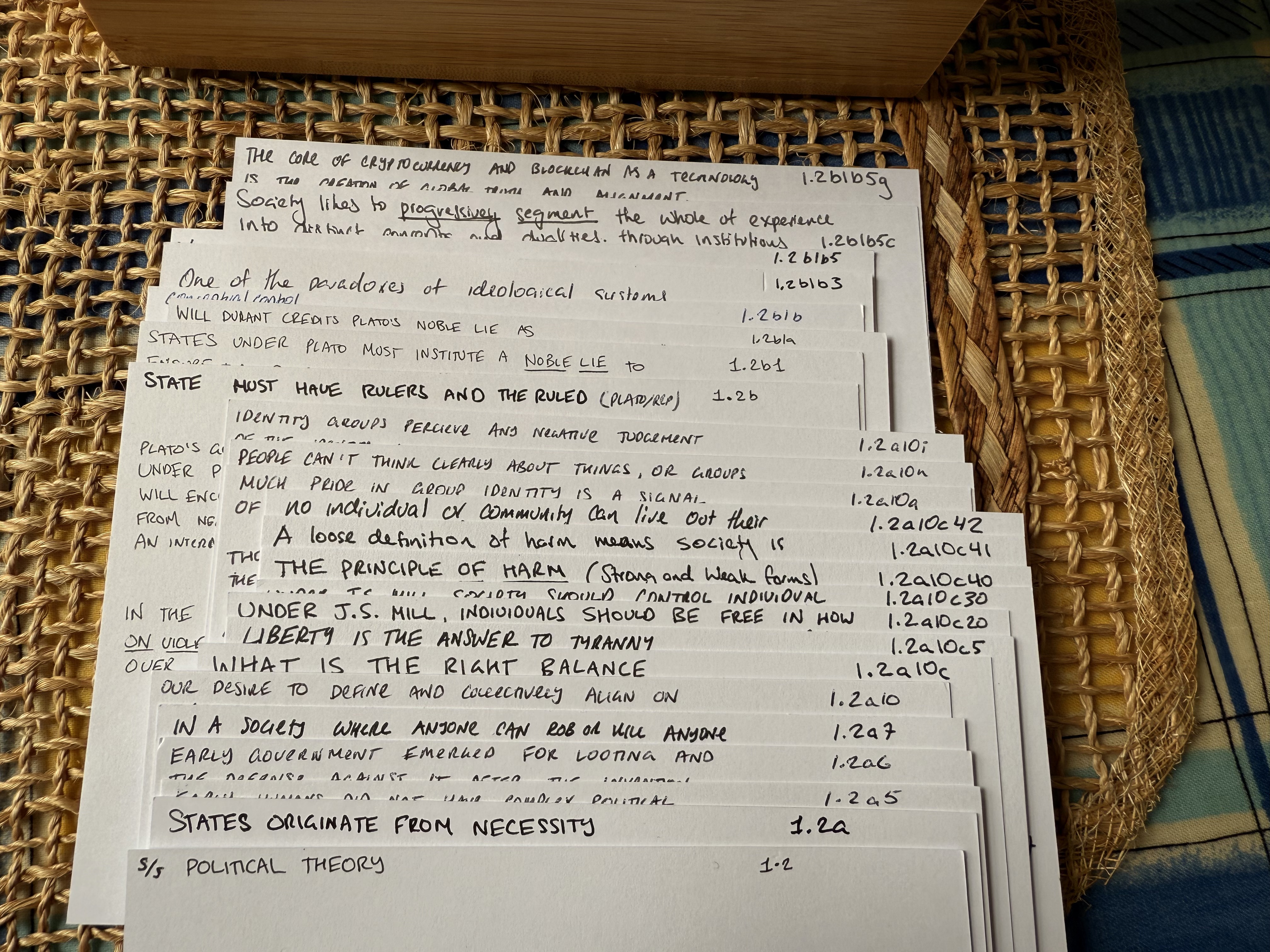
This isn't the linear path through conceptual space that reading someone else's book provides. This is forging your own unique trail through ideas. And this seems to be the kind of system that might, one day, help me discover novel ways to look at the world that results in interesting startup ideas!
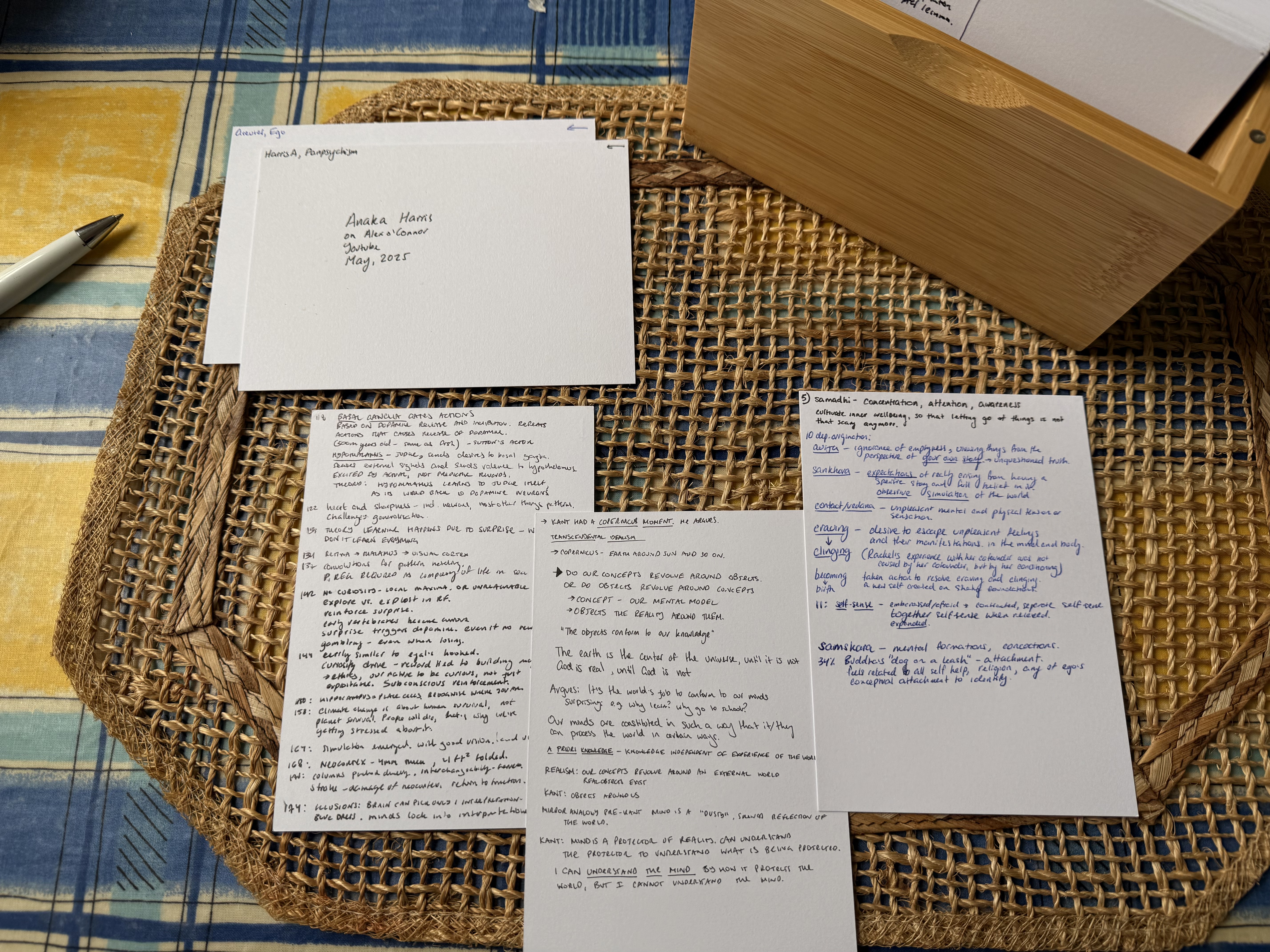
The Proof in the Pages
Over the past year, treating this as a part-time hobby alongside my software work, I've written about 600 cards containing 40,000-50,000 words - roughly the length of a book. A year ago, writing a book seemed impossibly daunting. Yet here I am with a book's worth of original ideas and reflections, created not through grinding discipline but through genuine enjoyment.
The system has actually changed how I read. Instead of dutifully finishing entire books, I read selectively, focusing on parts relevant to ideas I'm exploring. I read more books but more purposefully, making reading itself more engaging.
The Coming Divide
Paul Graham writes that the world is splitting into those who write and those who don't - and with AI this schism is now accelerating. We've been taught that reading something or firing off a quick take constitutes real thinking. The bar has dropped precipitously, and the pull is toward doing even less.
But like any skill worth having, thinking requires deliberate practice. We understand this for physical fitness - nobody expects to get athletic without effort. Yet somehow we've convinced ourselves that thinking should be effortless.
The Zettelkasten solves this by making the effort enjoyable. Luhmann himself said he only used the system when it brought him pleasure. After the initial habit forms, you don't need willpower. You need restraint - to stop yourself from spending entire days lost in the beautiful maze of your own evolving thoughts.
In an age racing to make thinking obsolete, I've found my rebellion in a recipe box full of handwritten cards. While others optimize for efficiency, I've optimized for actual thinking. The cards accumulate, ideas compound, and every day I discover that the most powerful technology for thought might just be pen, paper, and the courage to use them.
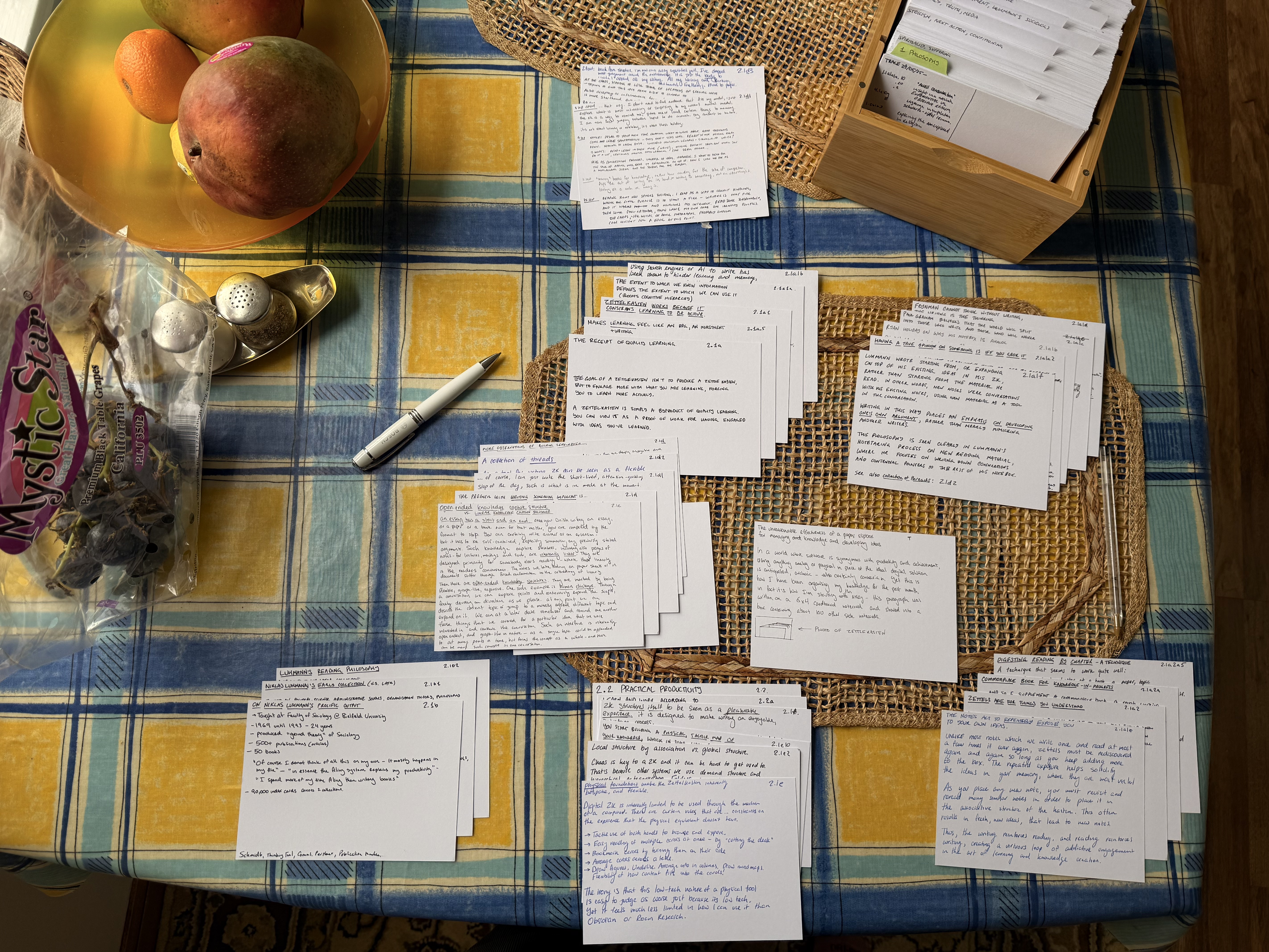
the cards I've collected to prompt much of this essay
other essays: